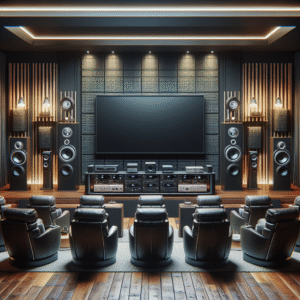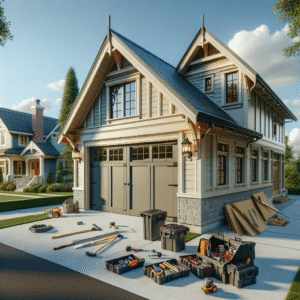Your HVAC (Heating, Ventilation, and Air Conditioning) system is one of the most critical components of your home, responsible for keeping your living environment comfortable year-round. However, like any mechanical system, it requires regular maintenance to function efficiently and reliably. Proper maintenance not only extends the life of your HVAC system but also ensures that it operates at peak performance, saving you money on energy bills and preventing costly repairs. In this blog, we’ll explore the essential steps you can take to maintain your HVAC system and extend its lifespan.
1. Understand the Components of Your HVAC System
Before diving into maintenance tips, it’s helpful to understand the key components of your HVAC system and their roles:
- Thermostat: The control center of your HVAC system, the thermostat regulates the temperature by signaling the system to heat or cool the home based on your settings.
- Furnace: The furnace is responsible for heating your home. It typically uses natural gas, oil, or electricity to generate heat, which is then distributed through your ductwork.
- Air Conditioner: The air conditioner cools your home by removing heat from the indoor air and releasing it outside. It consists of an indoor unit (evaporator coil) and an outdoor unit (condenser coil).
- Heat Pump: In some systems, a heat pump acts as both a heating and cooling unit, transferring heat between the indoors and outdoors depending on the season.
- Ductwork: The ducts distribute heated or cooled air throughout your home. Properly sealed and insulated ducts are essential for efficient airflow.
- Filters: HVAC filters trap dust, dirt, and other particles, preventing them from entering the system and the air you breathe. Regular filter replacement is crucial for maintaining air quality and system efficiency.
- Vents and Registers: These are the openings through which conditioned air enters your rooms. Keeping them clean and unobstructed is important for even air distribution.
2. Regular Maintenance Tasks to Perform
Routine maintenance is the key to keeping your HVAC system running smoothly and efficiently. Here are some essential tasks you should perform regularly:
2.1 Change or Clean the Air Filters
- Frequency: Air filters should be checked at least once a month and replaced or cleaned every 1 to 3 months, depending on the type of filter and the level of dust and allergens in your home.
- Importance: A clogged or dirty filter restricts airflow, forcing your HVAC system to work harder to maintain the desired temperature. This not only increases energy consumption but can also lead to overheating and system failure.
- Types of Filters: There are various types of HVAC filters, including fiberglass, pleated, washable, and high-efficiency particulate air (HEPA) filters. Choose the one that best suits your system and indoor air quality needs.
2.2 Clean the Condenser Coils
- Frequency: The condenser coils, located in the outdoor unit of your air conditioner or heat pump, should be cleaned at least once a year, preferably before the cooling season begins.
- Importance: Over time, dirt, leaves, and debris can accumulate on the condenser coils, reducing their ability to release heat. This forces the system to work harder, leading to increased energy consumption and wear and tear.
- How to Clean: Turn off the power to the unit, then use a garden hose to gently rinse the coils. Avoid using high-pressure water, as it can damage the fins. If the coils are heavily soiled, consider using a commercial coil cleaner or hiring a professional for deep cleaning.
2.3 Inspect and Clean the Evaporator Coils
- Frequency: The evaporator coils, located inside the indoor unit, should be inspected and cleaned annually.
- Importance: Evaporator coils absorb heat from the air inside your home. If they become dirty, they can’t absorb heat as effectively, reducing the cooling efficiency and potentially causing the system to freeze up.
- How to Clean: Access to the evaporator coils can be challenging, so this task is often best left to a professional technician. However, you can keep the area around the coils clean and ensure that the condensate drain is clear of clogs to prevent water damage.
2.4 Check and Seal Ductwork
- Frequency: Inspect your ductwork for leaks, holes, or loose connections at least once a year.
- Importance: Leaky ducts can cause significant energy loss, as conditioned air escapes before reaching the intended rooms. Sealing ducts can improve efficiency, reduce energy bills, and enhance indoor comfort.
- How to Seal: Use mastic sealant or metal tape to seal any gaps or leaks in the ductwork. Avoid using standard duct tape, as it may not provide a long-lasting seal. For extensive repairs, consider hiring a professional.
2.5 Clear the Area Around the Outdoor Unit
- Frequency: Regularly inspect the area around the outdoor unit and clear away any debris, such as leaves, grass, or branches, that could obstruct airflow.
- Importance: The outdoor unit needs adequate airflow to function efficiently. Obstructions can cause the system to overheat, leading to reduced efficiency and potential damage.
- How to Maintain: Keep at least two feet of clearance around the outdoor unit. Trim back any vegetation, and ensure that the unit is level to prevent compressor issues.
2.6 Test the Thermostat
- Frequency: Test your thermostat’s functionality at least once a year, preferably before the start of the heating or cooling season.
- Importance: A properly functioning thermostat ensures that your HVAC system operates efficiently and maintains a consistent temperature. Malfunctions can lead to uneven heating or cooling, higher energy bills, and unnecessary wear on the system.
- How to Test: Set the thermostat to a specific temperature and observe how the system responds. If the system doesn’t start or stop as expected, check the batteries or consider upgrading to a programmable or smart thermostat for better control and efficiency.
3. Schedule Professional HVAC Maintenance
While there are many tasks you can handle on your own, some aspects of HVAC maintenance are best left to professionals. Scheduling regular professional maintenance can help identify potential issues before they become major problems.
3.1 Annual HVAC Tune-Up
- What It Includes: A professional HVAC tune-up typically includes a thorough inspection of all system components, cleaning of coils and other parts, checking refrigerant levels, lubricating moving parts, and testing system performance.
- Benefits: Regular tune-ups can extend the life of your HVAC system, improve efficiency, reduce energy costs, and prevent unexpected breakdowns. Many HVAC manufacturers also require regular maintenance to keep warranties valid.
- When to Schedule: Ideally, schedule a tune-up twice a year—once in the spring for your air conditioning system and once in the fall for your heating system.
3.2 Duct Cleaning
- What It Includes: Professional duct cleaning involves removing dust, debris, and allergens from your ductwork, as well as inspecting for mold, pests, or damage.
- Benefits: Clean ducts improve indoor air quality, enhance system efficiency, and reduce allergens and dust in your home.
- When to Schedule: Consider duct cleaning every 3 to 5 years, or more frequently if you have pets, allergies, or live in a dusty environment.
4. Monitor and Address Potential Issues
Staying vigilant for signs of potential HVAC issues can help you address problems early, preventing costly repairs and extending the life of your system.
4.1 Listen for Unusual Noises
- Signs of Trouble: Unusual noises, such as banging, rattling, or squealing, can indicate mechanical issues, such as loose parts, motor problems, or failing components.
- What to Do: If you hear unusual noises, turn off the system and inspect the unit for visible issues. If you can’t identify the problem, contact a professional technician for an assessment.
4.2 Monitor Energy Bills
- Signs of Trouble: A sudden spike in energy bills without a corresponding increase in usage can indicate that your HVAC system is working harder than necessary, possibly due to inefficiencies or malfunctioning components.
- What to Do: Compare your energy bills to previous months and consider any changes in usage patterns. If your bills are consistently higher, schedule a professional inspection to identify and address the cause.
4.3 Check for Uneven Heating or Cooling
- Signs of Trouble: If some rooms are consistently warmer or cooler than others, it could indicate issues with your ductwork, thermostat, or HVAC system.
- What to Do: Ensure that vents and registers are open and unobstructed. If the problem persists, have your ductwork and system inspected by a professional to identify any underlying issues.
5. Consider Upgrades and Replacements
Even with regular maintenance, HVAC systems have a finite lifespan. If your system is aging or experiencing frequent issues, it may be time to consider an upgrade or replacement.
5.1 Upgrade to a High-Efficiency System
- Benefits: High-efficiency HVAC systems use less energy to heat and cool your home, resulting in lower energy bills and a smaller environmental footprint. These systems often come with advanced features like variable speed motors, smart thermostats, and improved air filtration.
- When to Upgrade: If your current system is more than 10-15 years old, or if you’re facing costly repairs, upgrading to a high-efficiency model may be more cost-effective in the long run.
5.2 Replace Aging Components
- Benefits: Replacing individual components, such as the thermostat, blower motor, or condenser, can improve system performance and extend the life of your HVAC system without the need for a full replacement.
- When to Replace: Consider replacing components when they start to show signs of wear or malfunction, especially if the rest of the system is still in good condition.
Conclusion
Proper maintenance is essential for extending the life of your HVAC system and ensuring it operates efficiently year-round. By performing regular tasks such as changing filters, cleaning coils, and scheduling professional tune-ups, you can prevent breakdowns, lower your energy bills, and enjoy a comfortable living environment. Staying vigilant for signs of potential issues and addressing them promptly will also help you avoid costly repairs and keep your HVAC system running smoothly for years to come. Whether you handle maintenance yourself or rely on professional services, taking care of your HVAC system is an investment in your home’s comfort and energy efficiency.








